Note to Scamper. Taylor Garner wants his hamstrings back.Luckily Rhyce isn’t the one who needs to be running on the field.
Navigation
Install the app
How to install the app on iOS
Follow along with the video below to see how to install our site as a web app on your home screen.
Note: This feature may not be available in some browsers.
More options
You are using an out of date browser. It may not display this or other websites correctly.
You should upgrade or use an alternative browser.
You should upgrade or use an alternative browser.
Opinion Commentary & Media IV
- Thread starter Flawed Genius
- Start date
- Tagged users None
- Status
- Not open for further replies.
You kinda knew this was coming HojumanIs AJAX the mainly Jewish ammo side ?
( p.s. SeeSee, you're not technically allowed to say Yahweh......ah...dammit )
"But we handed yoose two flags"
The * narrative 2 decades on.
With two heartbreaking 1 point losses.
Excellent.
- Apr 17, 2007
- 25,023
- 43,751
- AFL Club
- North Melbourne
- Other Teams
- hellas,liverpool,storm,au
The Godees would be in the gun before us but lucky for them they’re called Melbourne.I don't wish ill on St. Kilda (or any other club for that matter) but I think this is an important part of the strategy for us (at least in the short-term). I'm reminded of the two guys running away from a lion and one of them puts on his running shoes. The other says you can't outrun the lion and the guy replies "I just need to outrun you". We're never (in the short term) going to able to match Richmond/Collingwood in the financial stakes but the most important thing we can do is get to a position where we are not one of the clubs listed in these types of articles.
jimandphilbadge
Club Legend
I hadn't even thought of it from that angle.With two heartbreaking 1 point losses.
Excellent.
Delicious
- Aug 3, 2018
- 1,755
- 10,394
- AFL Club
- North Melbourne
With two heartbreaking 1 point losses.
Excellent.
Incredible that they also lost the 96 Qualifying final by 1 point.
Kanga Glory
Premium Gold
Have you got any links for this?
12pm today on fox footy
Incredible that they also lost the 96 Qualifying final by 1 point.
I'd completely forgotten about that.
see see
And don't forget the joker...
- May 30, 2007
- 12,193
- 51,158
- AFL Club
- North Melbourne
- Other Teams
- Deportivo Wanka
You spelled 'hilarious' wrong.Incredible that they also lost the 96 Qualifying final by 1 point.
ferball
desperately terminally-contrarian
- Jul 24, 2015
- 42,981
- 86,518
- AFL Club
- North Melbourne
Waite, Gibbo and LT were.Well look at who wasn’t on our Park two years later from that day.
waite
Petrie
Boomer
Gibo
BJ
LT
Wright
NDS
We were at the end of our cycle
ferball
desperately terminally-contrarian
- Jul 24, 2015
- 42,981
- 86,518
- AFL Club
- North Melbourne
Note to Scamper. Taylor Garner wants his hamstrings back.
I don't think he does actually.
ferball
desperately terminally-contrarian
- Jul 24, 2015
- 42,981
- 86,518
- AFL Club
- North Melbourne
Unless they come with beers attached.
jimandphilbadge
Club Legend
Throw in that the only final they won that year was against a well past its prime West Coast (which should have been in Perth, but due to the stupid old final 8 system and then MCG agreement, WCE who finished higher and won in week 1 had to play in Melbourne), it makes the * hard done by narrative even funnier. Entitled wank stains.Incredible that they also lost the 96 Qualifying final by 1 point.
see see
And don't forget the joker...
- May 30, 2007
- 12,193
- 51,158
- AFL Club
- North Melbourne
- Other Teams
- Deportivo Wanka
That was the original win/win scenario - West Coast got royally screwed by the AFL and *'s win set them up to have their dreams cruelly crushed by Sydney the following week. What a time to be a North fan.Throw in that the only final they won that year was against a well past its prime West Coast (which should have been in Perth, but due to the stupid old final 8 system and then MCG agreement, WCE who finished higher and won in week 1 had to play in Melbourne), it makes the * hard done by narrative even funnier. Entitled wank stains.
Thndr
Club Legend
Aussies go berserk for crossover logos
A very creative footy fan has created a set of brilliant new AFL club logos, drawing from the NBA.
Yuck, im not adverse to the idea but surely we needed to be the angry bull.
- Feb 19, 2016
- 29,260
- 36,586
- AFL Club
- North Melbourne
There is no footy god since he has two premiership medals.No that i needed reminding, but Riewoldt is such a loathsome mofo.
Whinging to the ump after Nahas's tackle on Chapmanand all of his other prima donna look at me antics
Bigeasy
I'm here for the buffet
Extreme violence is the best way to back off bullies*.
*Not a recommendation, just an observation.
Some of you blokes would have struggled around Flemington, Broadmeadows or out west if Doveton kept you awake at night.
It was not uncommon at the now defunct North Melbourne-Kensington footy games for pistols come out.
Ah yes North Melbourne- Kensington where after an under 15s game where we beat them by 10 goals, they circled our rooms waiting to punch on. After about 10 minutes our Captain, Werner, turned to us and said we beat these campaigners at footy now let's beat the crap out of them. Our coach insisted we stay in the rooms, Werner opened the door and said who's coming? What else could we do but to follow him. We walk out and half of their team had left leaving about a dozen of them against 20 odd of us.
Those dozen bastards still wanted to punch on even though they were basically outnumbered 2 to 1 until Werner said captain on captain only which would have been an awesome fight if the coaches and parents didnt intervene.
There was a "kid" called Eddie who played for them who if he was under 15, then i was Wayne Carey. The guy smoked at the breaks and had a moustache ffs.
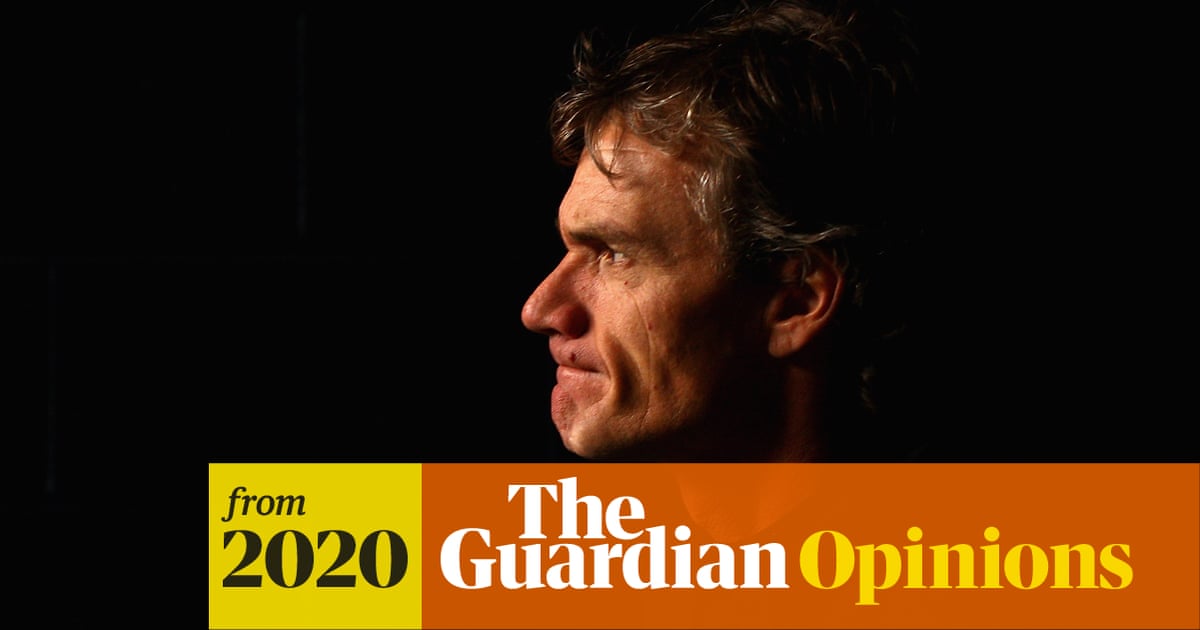
Clicks and dollars trump ethics for media that published leaked photos of Dean Laidley | Rohan Connolly
Choosing to run these images makes all the fine words about care for mental health seem hollow
RoCo nails it as always.
see see
And don't forget the joker...
- May 30, 2007
- 12,193
- 51,158
- AFL Club
- North Melbourne
- Other Teams
- Deportivo Wanka
Hey guys, I'm thinking of starting a GoFundMe page for Rupert, who's doing things a bit tough these days. Who's in?
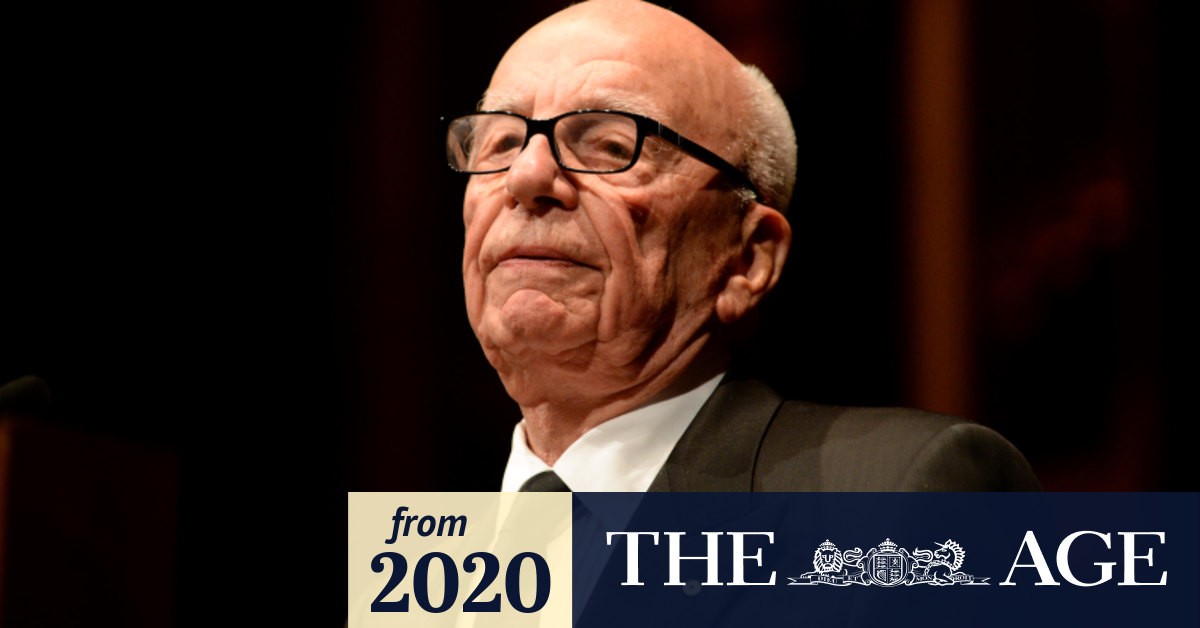
 www.theage.com.au
www.theage.com.au
Rupert Murdoch gives up bonus as News Corp writes down value of Foxtel
News Corporation has written down the value of pay-TV operator Foxtel by $1.4 billion as it warned investors the COVID-19 pandemic would have a material impact on its business.
I will chip in some petrol and a box of matches, if you supply the firewood.Hey guys, I'm thinking of starting a GoFundMe page for Rupert, who's doing things a bit tough these days. Who's in?

Rupert Murdoch gives up bonus as News Corp writes down value of Foxtel
News Corporation has written down the value of pay-TV operator Foxtel by $1.4 billion as it warned investors the COVID-19 pandemic would have a material impact on its business.www.theage.com.au
krakouers
Certified with Bonz Tick of Approval
- Sep 13, 2011
- 18,632
- 37,474
- AFL Club
- North Melbourne
- Other Teams
- Claremont
For the more mature gentleman on here: 24 games for us
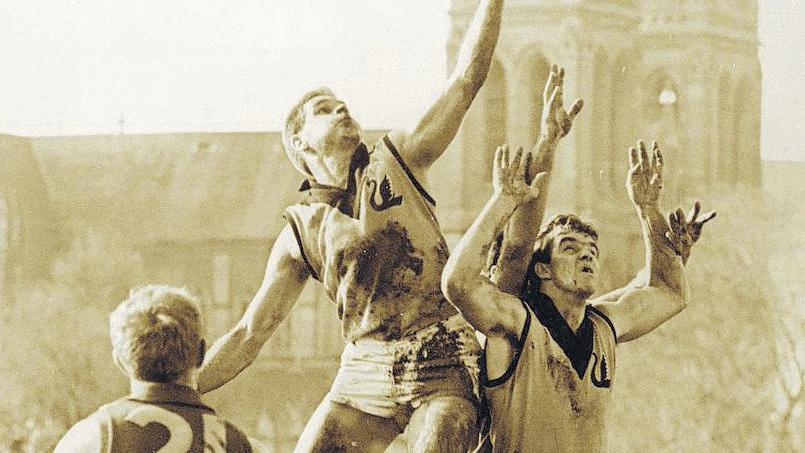
 thewest.com.au
thewest.com.au
WA Footy 101: Brad Smith, the quiet man who would not surrender
John Townsend
The West Australian
Thursday, 7 May 2020
 Graham Farmer + Brad Smith (front) WA v SA Adelaide Oval 1969 Credit: Supplied/Supplied
Graham Farmer + Brad Smith (front) WA v SA Adelaide Oval 1969 Credit: Supplied/Supplied
There are two famous images that define Brad Smith, the dogged, committed, powerful and forever team-first footballer.
The first was taken at Adelaide Oval in 1969.
As St Peter’s Cathedral looms in the background, a muddied Smith backs into a pack as a floating Graham Farmer taps the ball clear.
The second, lost to the archives, was in the dying moments of the 1978 WAFL grand final.
East Perth are up by two points but Perth, fired by Peter Bosustow’s last-quarter heroics, are charging hard in the torrential rain.
The ball is kicked deep into Perth’s forward line only for the diving Smith to slide for metres on the wet turf after taking the most significant defensive mark of his career.
There are some Royals who argue it was the most famous mark in the club’s history.
Both moments were typical of a player whose career and character might have been understated but were never undervalued.
And it was a career that, while it may not have the same profile, bears comparison to some of the greatest players in the game. It was certainly as eventful.
 A 40th Anniversary of South Fremantle v East Fremantle Grand Final derby 22 September 1979. Credit: The West Australian
A 40th Anniversary of South Fremantle v East Fremantle Grand Final derby 22 September 1979. Credit: The West Australian
Smith had vital roles in two premiership teams at East Perth, coached East Fremantle to a flag in front of WA’s biggest crowd in his debut season, played in eight grand finals — including his first year at North Melbourne — and was a State regular.
He played at key positions in attack and defence, rucked and ruck-roved, played on forward and back flanks, and in the pockets. He was rarely beaten but never surrendered.
And he was sacked by East Fremantle a year after the premiership and while still the incumbent State coach.
Mal Brown, who swung the 190cm Smith into the ruck at times during the 1972 premiership season when Brown, Ron Alexander, Dave Whittle and Eddie Pitter were not getting the job done, reckons Smith was unmatched in two areas.
“I don’t think I came across a player who was mentally tougher than Brad,” Brown said.
“And he was perhaps the best mark I have seen. He never dropped the ball.
“He never said much but boy could he play football.”
Smith was just 16 and already close to his full size when East Perth’s Hec Strempel went to Boyanup-Capel-Dardanup in 1965 and beat the other seven WAFL clubs for the rising star’s signature.
 Picture: Brad Smith Credit: Supplied
Picture: Brad Smith Credit: Supplied
It was to be a productive relationship for a team that suffered heartache throughout the 1960s — with six grand final losses in the decade — despite the presence of some of the game’s most brilliant players and coaches of the profile of Jack Sheedy and Kevin Murray.
Smith might not have been considered as brilliant as Brown, Derek Chadwick or Ken McAullay but he was as versatile as anyone in the league and so durable that he barely missed a match in the second half of that decade.
It was not until he snapped an Achilles at Perth Oval in 1971 — Brown said it sounded like someone had fired a .22 rifle on the field — that Smith was finally grounded.
Yet Smith would return so strongly the following year that he starred in East Perth’s drought-breaking grand final win when he was part of Brown’s tactic of using three ruckmen at bouncedowns to counter Claremont’s Graham Moss.
Smith then fitted in superbly at the Kangaroos, being part of the 1974 grand final loss to Richmond, before his return to Perth saw him play a central part in several eventful seasons.
Barry Cable took over the East Perth reins in 1978 with Smith, by now a veteran who would play his 200th match in the opening month, helping the Royals complete a remarkable journey into and through the finals.
 Picture: Brad Smith Credit: Supplied
Picture: Brad Smith Credit: Supplied
East Perth were four wins out of the four at the start of July but came home with a wet sail to win seven matches in a row and reach their eighth grand final in Smith’s time at the club.
It was a nail-biter. East Perth were fortunate that they were two points up and Smith was in the right place at the right time with the ball in those powerful hands just before the siren went.
Smith was a surprise appointment at East Fremantle a month later, and while he was no great communicator, preferring to allow his players to play to their ability without undue interference, he made several astute recruiting moves after assessing the team’s balance.
The most significant was the arrival of his old teammate Ian Thomson, who was playing in the Sunday League but joined Old Easts halfway through the season.

WA Footy 101: The quiet, dogged Brad Smith
There are two famous images that define Brad Smith, the dogged, committed, powerful and forever team-first footballer. Here’s his tale.
WA Footy 101: Brad Smith, the quiet man who would not surrender
John Townsend
The West Australian
Thursday, 7 May 2020
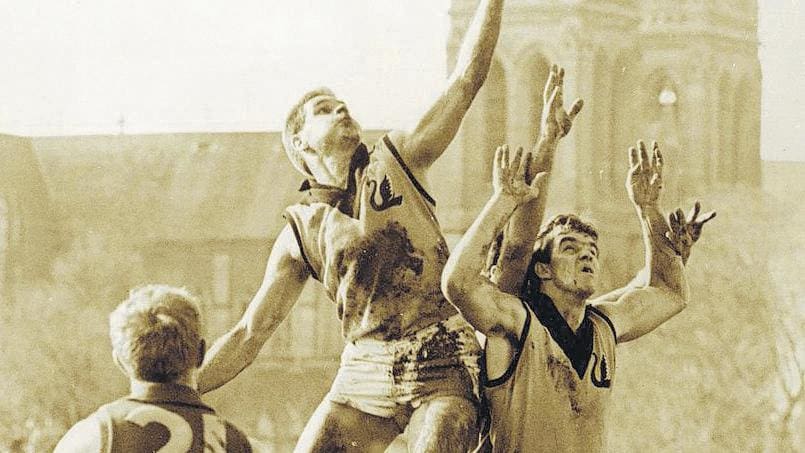
There are two famous images that define Brad Smith, the dogged, committed, powerful and forever team-first footballer.
The first was taken at Adelaide Oval in 1969.
As St Peter’s Cathedral looms in the background, a muddied Smith backs into a pack as a floating Graham Farmer taps the ball clear.
The second, lost to the archives, was in the dying moments of the 1978 WAFL grand final.
East Perth are up by two points but Perth, fired by Peter Bosustow’s last-quarter heroics, are charging hard in the torrential rain.
The ball is kicked deep into Perth’s forward line only for the diving Smith to slide for metres on the wet turf after taking the most significant defensive mark of his career.
There are some Royals who argue it was the most famous mark in the club’s history.
Both moments were typical of a player whose career and character might have been understated but were never undervalued.
And it was a career that, while it may not have the same profile, bears comparison to some of the greatest players in the game. It was certainly as eventful.
Smith had vital roles in two premiership teams at East Perth, coached East Fremantle to a flag in front of WA’s biggest crowd in his debut season, played in eight grand finals — including his first year at North Melbourne — and was a State regular.
He played at key positions in attack and defence, rucked and ruck-roved, played on forward and back flanks, and in the pockets. He was rarely beaten but never surrendered.
And he was sacked by East Fremantle a year after the premiership and while still the incumbent State coach.
Mal Brown, who swung the 190cm Smith into the ruck at times during the 1972 premiership season when Brown, Ron Alexander, Dave Whittle and Eddie Pitter were not getting the job done, reckons Smith was unmatched in two areas.
“I don’t think I came across a player who was mentally tougher than Brad,” Brown said.
“And he was perhaps the best mark I have seen. He never dropped the ball.
“He never said much but boy could he play football.”
Smith was just 16 and already close to his full size when East Perth’s Hec Strempel went to Boyanup-Capel-Dardanup in 1965 and beat the other seven WAFL clubs for the rising star’s signature.
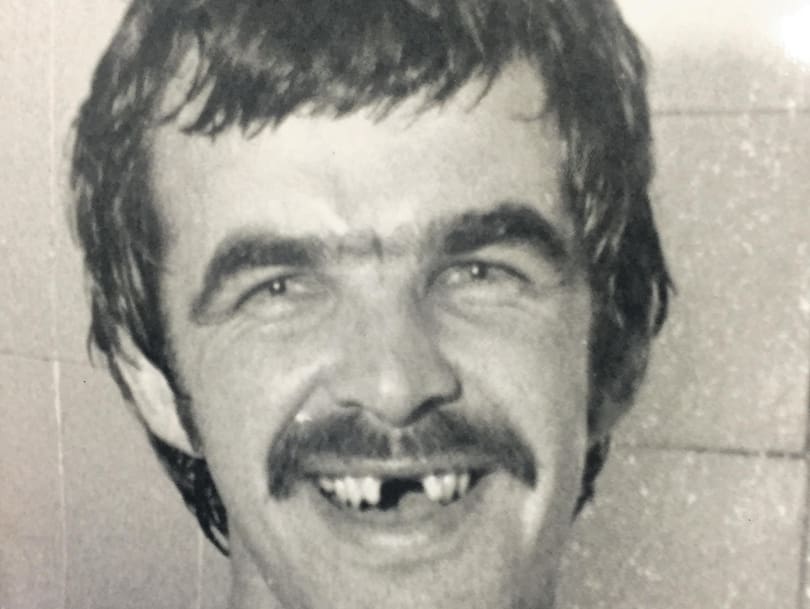
It was to be a productive relationship for a team that suffered heartache throughout the 1960s — with six grand final losses in the decade — despite the presence of some of the game’s most brilliant players and coaches of the profile of Jack Sheedy and Kevin Murray.
Smith might not have been considered as brilliant as Brown, Derek Chadwick or Ken McAullay but he was as versatile as anyone in the league and so durable that he barely missed a match in the second half of that decade.
It was not until he snapped an Achilles at Perth Oval in 1971 — Brown said it sounded like someone had fired a .22 rifle on the field — that Smith was finally grounded.
Yet Smith would return so strongly the following year that he starred in East Perth’s drought-breaking grand final win when he was part of Brown’s tactic of using three ruckmen at bouncedowns to counter Claremont’s Graham Moss.
Smith then fitted in superbly at the Kangaroos, being part of the 1974 grand final loss to Richmond, before his return to Perth saw him play a central part in several eventful seasons.
Barry Cable took over the East Perth reins in 1978 with Smith, by now a veteran who would play his 200th match in the opening month, helping the Royals complete a remarkable journey into and through the finals.
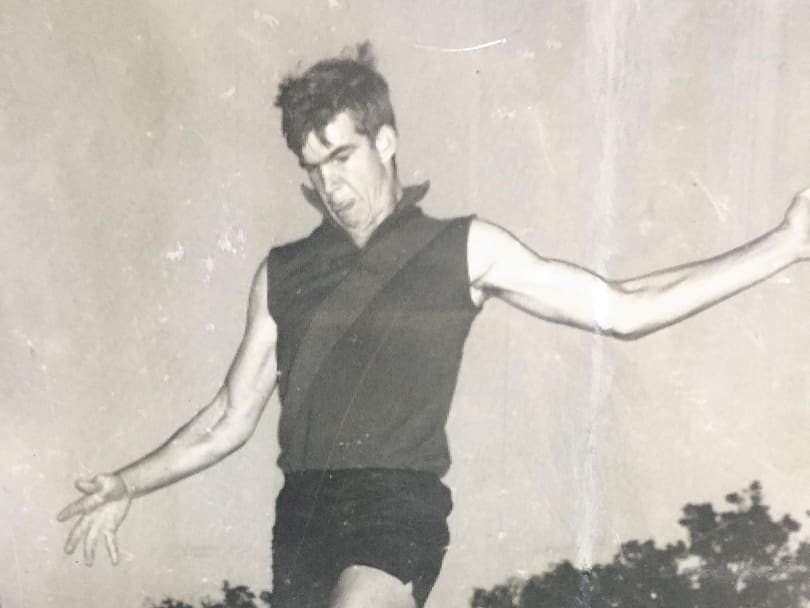
East Perth were four wins out of the four at the start of July but came home with a wet sail to win seven matches in a row and reach their eighth grand final in Smith’s time at the club.
It was a nail-biter. East Perth were fortunate that they were two points up and Smith was in the right place at the right time with the ball in those powerful hands just before the siren went.
Smith was a surprise appointment at East Fremantle a month later, and while he was no great communicator, preferring to allow his players to play to their ability without undue interference, he made several astute recruiting moves after assessing the team’s balance.
The most significant was the arrival of his old teammate Ian Thomson, who was playing in the Sunday League but joined Old Easts halfway through the season.
I will chip in some petrol and a box of matches, if you supply the firewood.
O2 cylinder help ?
Terrible kick... worst kick ive ever seenSpitta
For the more mature gentleman on here: 24 games for us

WA Footy 101: The quiet, dogged Brad Smith
There are two famous images that define Brad Smith, the dogged, committed, powerful and forever team-first footballer. Here’s his tale.thewest.com.au
WA Footy 101: Brad Smith, the quiet man who would not surrender
John Townsend
The West Australian
Thursday, 7 May 2020
Graham Farmer + Brad Smith (front) WA v SA Adelaide Oval 1969 Credit: Supplied/Supplied
There are two famous images that define Brad Smith, the dogged, committed, powerful and forever team-first footballer.
The first was taken at Adelaide Oval in 1969.
As St Peter’s Cathedral looms in the background, a muddied Smith backs into a pack as a floating Graham Farmer taps the ball clear.
The second, lost to the archives, was in the dying moments of the 1978 WAFL grand final.
East Perth are up by two points but Perth, fired by Peter Bosustow’s last-quarter heroics, are charging hard in the torrential rain.
The ball is kicked deep into Perth’s forward line only for the diving Smith to slide for metres on the wet turf after taking the most significant defensive mark of his career.
There are some Royals who argue it was the most famous mark in the club’s history.
Both moments were typical of a player whose career and character might have been understated but were never undervalued.
And it was a career that, while it may not have the same profile, bears comparison to some of the greatest players in the game. It was certainly as eventful.
A 40th Anniversary of South Fremantle v East Fremantle Grand Final derby 22 September 1979. Credit: The West Australian
Smith had vital roles in two premiership teams at East Perth, coached East Fremantle to a flag in front of WA’s biggest crowd in his debut season, played in eight grand finals — including his first year at North Melbourne — and was a State regular.
He played at key positions in attack and defence, rucked and ruck-roved, played on forward and back flanks, and in the pockets. He was rarely beaten but never surrendered.
And he was sacked by East Fremantle a year after the premiership and while still the incumbent State coach.
Mal Brown, who swung the 190cm Smith into the ruck at times during the 1972 premiership season when Brown, Ron Alexander, Dave Whittle and Eddie Pitter were not getting the job done, reckons Smith was unmatched in two areas.
“I don’t think I came across a player who was mentally tougher than Brad,” Brown said.
“And he was perhaps the best mark I have seen. He never dropped the ball.
“He never said much but boy could he play football.”
Smith was just 16 and already close to his full size when East Perth’s Hec Strempel went to Boyanup-Capel-Dardanup in 1965 and beat the other seven WAFL clubs for the rising star’s signature.
Picture: Brad Smith Credit: Supplied
It was to be a productive relationship for a team that suffered heartache throughout the 1960s — with six grand final losses in the decade — despite the presence of some of the game’s most brilliant players and coaches of the profile of Jack Sheedy and Kevin Murray.
Smith might not have been considered as brilliant as Brown, Derek Chadwick or Ken McAullay but he was as versatile as anyone in the league and so durable that he barely missed a match in the second half of that decade.
It was not until he snapped an Achilles at Perth Oval in 1971 — Brown said it sounded like someone had fired a .22 rifle on the field — that Smith was finally grounded.
Yet Smith would return so strongly the following year that he starred in East Perth’s drought-breaking grand final win when he was part of Brown’s tactic of using three ruckmen at bouncedowns to counter Claremont’s Graham Moss.
Smith then fitted in superbly at the Kangaroos, being part of the 1974 grand final loss to Richmond, before his return to Perth saw him play a central part in several eventful seasons.
Barry Cable took over the East Perth reins in 1978 with Smith, by now a veteran who would play his 200th match in the opening month, helping the Royals complete a remarkable journey into and through the finals.
Picture: Brad Smith Credit: Supplied
East Perth were four wins out of the four at the start of July but came home with a wet sail to win seven matches in a row and reach their eighth grand final in Smith’s time at the club.
It was a nail-biter. East Perth were fortunate that they were two points up and Smith was in the right place at the right time with the ball in those powerful hands just before the siren went.
Smith was a surprise appointment at East Fremantle a month later, and while he was no great communicator, preferring to allow his players to play to their ability without undue interference, he made several astute recruiting moves after assessing the team’s balance.
The most significant was the arrival of his old teammate Ian Thomson, who was playing in the Sunday League but joined Old Easts halfway through the season.
My lasting memory of him Kraks is a photo story of him grand final week 1974. Bertie hopefully confirm this.
Story on how he had married l think a Dutch divorcee or widow with 4 / 5 kids. Still picture him sitting down with one of the kids on his knee and her quite tall standing behind the other kids.
Ring any bells ?
- Status
- Not open for further replies.





